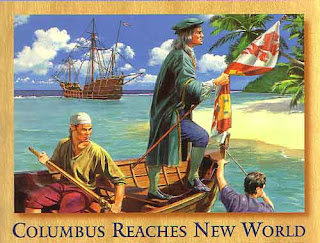A Holy Tragedy
Warning: God's sled dog bares her teeth in this one.
On Monday of this week, Americans will observe one of the greatest tragedies of human history, a moment of such profound misunderstanding that over 500 years later we are still reeling from its legacy of racism, slavery and the conviction that the natural world exists to be depleted by force, forced to return an escalating profit under the cool rubric of "economic growth."
On Monday of this week, Americans will remember the initial meeting of two great human projects: on the one hand, a culture of sin and striving, a culture of invention and exploration, a restless culture of chivalry and crusade, where men dominated women, kings dominated peasants and religion sought to dominate all, a culture in which women were kept away from nature and burned as witches if we tried to get back; on the other hand, a culture based in nature, a culture that practiced equality between men and women, and could see difference without inferiority, a culture whose religion was a quest for truth rather than a quest for power. The meeting that we remember Monday was between a culture of insatiable desperation and a culture of incredible abundance.
Part of Hispaniola later became Haiti, the only land in the New World where enslaved people rose up against their "masters" and won. The European nations, driven by economic need and fear, all ganged up on this one small part of an island and crushed it, lest other enslaved people get "ideas." Meanwhile, a continent was looted, and genocide became a norm.
One of Columbus' most archetypal acts in the New World was his rape of a young girl. Because she wore few clothes and lived close to nature, he assumed she was a sexual savage, a practitioner of the kind of witchcraft and depravity that would drive a man wild with delight. He could not wait to taste her. Unfortunately, she was, in fact, a modest girl, terrified of this crazy man and his view of her as sinful and dirty. When I read the story of this encounter in Catherine Keller's Apocalypse: Now and Then, I heard the pain of the entire universe crying out in my dreams that night. I was never the same again.
But Republicans believe there is such a thing as "legitimate rape."
A "leisure class" whose privilege depends upon depriving other human beings of their autonomy and their access to grace earns only the privilege of delusion. We are stressed in this world that slavery built, not because of our work schedules, but because we know that others have suffered for us and we know that this is wrong. But because we believe that this is "just the way things are," we soldier on and try to make the best of it.
The Native People of our continent remind us that how we live is not "the way things are." It is a conscious choice. All the world's religions teach that insatiable desire leads only to disaster. Only the capitalist systems of the world are built upon a "norm" of insatiable desire. The Native People have a great deal to teach us. They know how to live well within their means, to balance work and leisure. They taught me what meaningful work looks like. They also fight with one another, have bad moods and make bad decisions. They are only human.
To change Columbus Day to Indigenous People's Day is not "political correctness." It is an affirmation of hope that we, too, can change for the better. The entire planet eagerly awaits our "yes."

Comments